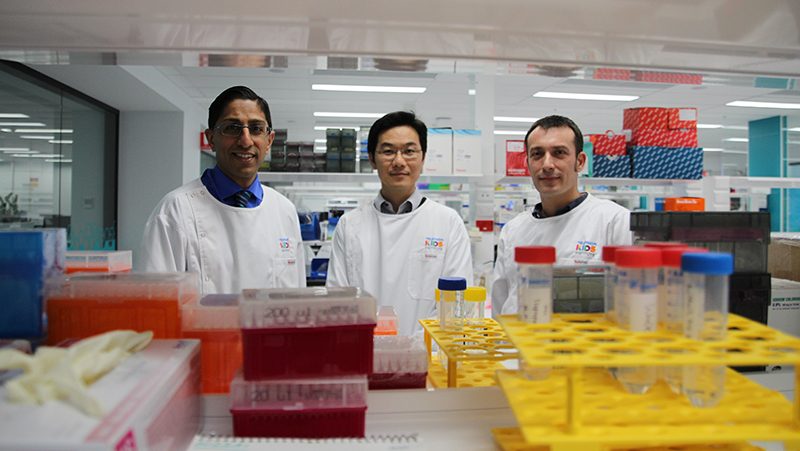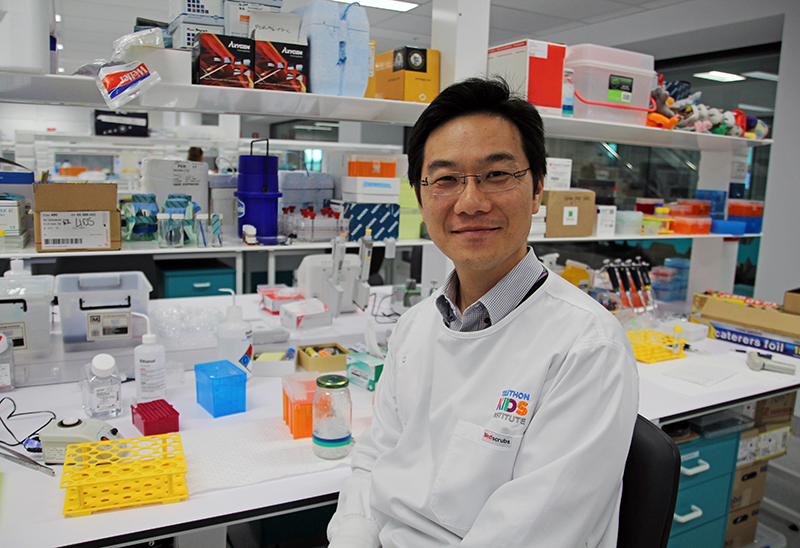Search
Research
Glucocorticoid resistance in T-lineage acute lymphoblastic leukaemia is associated with a proliferative metabolismWe examined the baseline profile of a panel of T-ALL cell lines to determine factors that contribute to GC resistance without prior drug selection.

News & Events
Lightening the leukaemia load for kids with Down syndromeKids born with Down syndrome are at high risk of an array of health problems. One of the lesser-known complications is their increased risk of childhood leukaemia.

News & Events
Working to end childhood cancer: A father’s storyDr Laurence Cheung is doing everything he can to end the threat of childhood leukemia. His research has the potential to change countless lives, but he also has another important job – being a dad to three beautiful children.
Research
Novel therapeutics approaches for infants with high-risk infant acute lymphoblastic leukaemiaRishi S. Laurence Sébastien Kotecha Cheung Malinge MB ChB (Hons) MRCPCH FRACP PhD BPharm (Hons) MBA PhD PhD Co-Head, Leukaemia Translational Research
Research
Delivery of PEGylated liposomal doxorubicin by bispecific antibodies improves treatment in models of high-risk childhood leukemiaHigh-risk childhood leukemia has a poor prognosis because of treatment failure and toxic side effects of therapy. Drug encapsulation into liposomal nanocarriers has shown clinical success at improving biodistribution and tolerability of chemotherapy. However, enhancements in drug efficacy have been limited because of a lack of selectivity of the liposomal formulations for the cancer cells.
Research
Aberrant expression of aldehyde dehydrogenase 1A (ALDH1A) subfamily genes in acute lymphoblastic leukaemia is a common feature of T-lineage tumoursThe class 1A aldehyde dehydrogenase (ALDH1A) subfamily of genes encode enzymes that function at the apex of the retinoic acid (RA) signalling pathway.
Research
Case Report: Long-Term Survival of a Pediatric Patient With an Intra-Abdominal Undifferentiated Carcinoma of Unknown PrimaryThis report provides detailed characterization of carcinoma of unknown primary (CUP) in a young child and in the absence of defined therapeutic guidelines for pediatric CUP, the successful treatment strategy described should be considered for similar cases.
Research
Blinatumomab as bridging therapy in paediatric B-cell acute lymphoblastic leukaemia complicated by invasive fungal diseaseInvasive fungal disease (IFD) remains a challenging complication of treatment for paediatric acute leukaemia. Consensus fungal treatment guidelines recommend withholding chemotherapy to facilitate immune recovery in this setting, yet prolonged delays in leukaemia therapy increase risk of relapse.
Research
Efficacy of DYRK1A inhibitors in novel models of Down syndrome acute lymphoblastic leukemiaDespite significant advances, outcomes for children with Down syndrome (DS, trisomy 21) who develop acute lymphoblastic leukemia remain poor. Reports of large DS-ALL cohorts have shown that children with DS have inferior event-free survival and overall survival compared to children without DS.
Research
Minimising Adverse Drug Reactions and Verifying Economic Legitimacy-Pharmacogenomics Implementation in Children (MARVEL- PIC): protocol for a national randomised controlled trialDNA-informed prescribing (termed pharmacogenomics, PGx) is the epitome of personalised medicine. Despite international guidelines existing, its implementation in paediatric oncology remains sparse.
